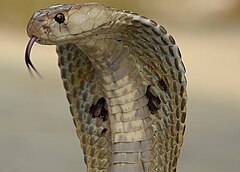
Back الحافز المنحرف Arabic Incentivo perverso Spanish विकृत प्रोत्साहन Hindi Այլասերված խթան Armenian Insentif yang salah kaprah ID 비뚤어진 인센티브 Korean Perverse prikkel Dutch Perverst insentiv NB Incentivo perverso Portuguese විකෘති දිරිගැන්වීම Singhalese
| Part of a series on |
| Economics |
|---|
 |
The phrase "perverse incentive" is often used in economics to describe an incentive structure with undesirable results, particularly when those effects are unexpected and contrary to the intentions of its designers.[1]

The results of a perverse incentive scheme are also sometimes called cobra effects, where people are incentivized to make a problem worse. This name was coined by economist Horst Siebert based on an anecdote taken from the British Raj.[2][3] The British government, concerned about the number of venomous cobras in Delhi, offered a bounty for every dead cobra. Initially, this was a successful strategy; large numbers of snakes were killed for the reward. Eventually, however, people began to breed cobras for the income. When the government became aware of this, the reward program was scrapped. The cobra breeders set their snakes free, leading to an overall increase in the wild cobra population.[4][5]
- ^ Brickman, Leslie H. (2002). Preparing the 21st Century Church. Xulon Press. p. 326. ISBN 978-1591601678.
- ^ Siebert, Horst (2001). Der Kobra-Effekt. Wie man Irrwege der Wirtschaftspolitik vermeidet (in German). Munich: Deutsche Verlags-Anstalt. ISBN 3421055629.
- ^ Dubner, Stephen J. (11 October 2012). "The Cobra Effect: A New Freakonomics Radio Podcast". Freakonomics, LLC. Retrieved 24 February 2015.
- ^ Schwarz, Christian A. (1996). NCD Implementation Guide. Carol Stream Church Smart Resources. p. 126. Cited in Brickman, p. 326.
- ^ Coy, Peter (26 March 2021). "Goodhart's Law Rules the Modern World. Here Are Nine Examples". Bloomberg.com. Retrieved 12 January 2023.